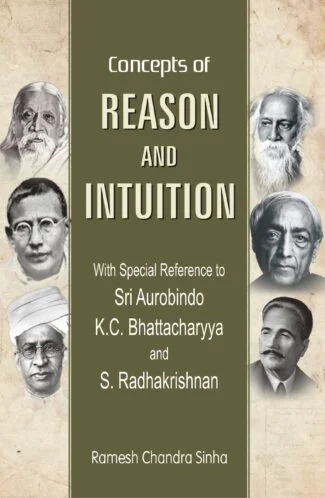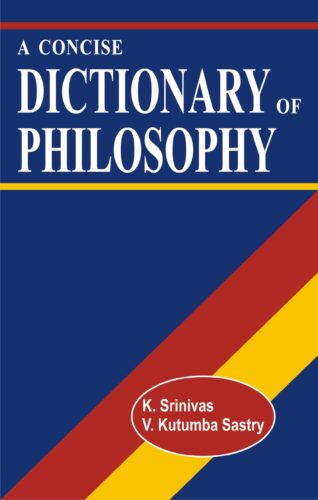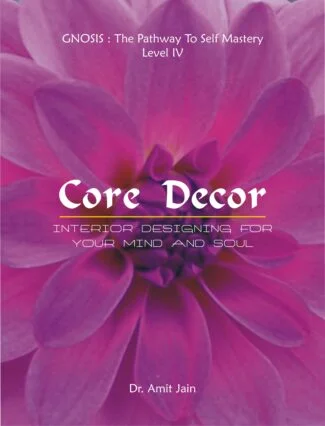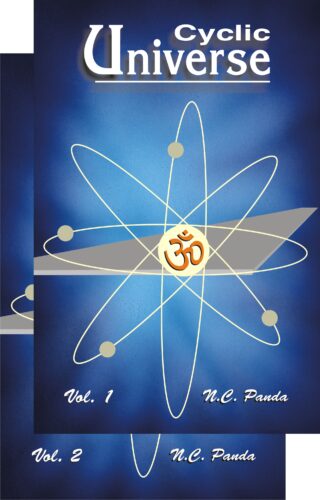Showing 37–48 of 302 results

This book articulates the philosophical thought of the twentieth-century Indian philosophers Sri Aurobindo, K.C. Bhattacharyya and S. Radhakrishnan. It provides a profound understanding of Reason and Intiution while giving admirable understanding of other important metaphysical and religious problems.
This work is a systematic and critical study of two most important problems of philosophy Reason and Intuition. The philosophical thought of the twentieth-century Indian thinkers articulates fresh ideas. Though they accept the metaphysical doctrines of Vedànta, one finds a good deal of originality in their world-views. The great thinkers are fully aware that unless they interpret and formulate the traditional truths in the modern framework of ideas, they would cease to inspire. There seems to be a distinct change in their views concerning man’s existence in the world.
The book embodies a fresh approach towards critical evaluation of some theories and gives valuable insights. It attempts to make relevant comparisons of the views of Indian thinkers with those of some of the eminent thinkers of the West.
In the detailed study of Sri Aurobindo, K.C. Bhattacharyya and S. Radhakrishnan, the author shows, not only a profound grasp of the concepts of Reason and Intuition, but also the admirable understanding of other important metaphysical and religious problems.
This book cannot miss the sight of students of philosophy, researchers and scholars.

This dictionary serves as an immediate reference book to the teachers and the students of philosophy and also to the general readers. It covers as many as seventeen hundred entries that include the most commonly used philosophical terms of the East and the West and the brief biographies of prominent philosophers of the Orient as well as the Occident.
This dictionary serves as an immediate reference book to the teachers and the students of philosophy and also to the general readers. It covers as many as seventeen hundred entries that include the most commonly used philosophical terms of the East and the West and the brief biographies of prominent philosophers of the Orient as well as the Occident.

This dictionary serves as an immediate reference book to the teachers and the students of philosophy and also to the general readers. It covers as many as seventeen hundred entries that include the most commonly used philosophical terms of the East and the West and the brief biographies of prominent philosophers of the Orient as well as the Occident.
This dictionary serves as an immediate reference book to the teachers and the students of philosophy and also to the general readers. It covers as many as seventeen hundred entries that include the most commonly used philosophical terms of the East and the West and the brief biographies of prominent philosophers of the Orient as well as the Occident.
The aim of this book is to achieve a proper theoretical understanding of democracy through philosophical explorations. By these explorations we want to reach some unitary decision on at least three things. The first one involves the concept of democracy. The next one is concerned with the purpose of democracy. The final one is concerned with what is necessary for ensuring and developing democracy in a state or society in the absence of which democracy gets threatened. We will explore and analyze the interconnections between these three dynamics.

This authoritative sourcebook reflects the extensive contributions of K.R. Rao over sixty years of professional engagement, blending theory and empirical research, leadership and scholarship, and classical and contemporary perspectives of Eastern and Western thoughts in a trans-disciplinary setting.
Consciousnes, Gandhi and Yoga explores the cross-cultural and interdisciplinary Odyssey of K. Ramakrishna Rao spanning over a period of sixty years. Rao’s journey is a voyage of discovery of hidden treasures of consciousness in both the East and the West; and this volume is an authoritative sourcebook detailing and discussing that voyage by scholars from around the world. We find here reflections on the extensive contributions of K.R. Rao which contain a rare, and in some ways unique, blend of theory and empirical research, leadership and scholarship, and classical and contemp-orary perspectives of Eastern and Western thoughts in a trans-disciplinary setting.
Ramakrishna Rao has carried out extensive empirical research collecting data on hidden human potentials and is engaged in providing for them appropriate conceptual framework and theoretical base in cross-cultural consciousness studies. Further, he creatively anchors Gandhian thought and practices to the current developments in consciousness studies.
The authors include Prof. Rao’s colleagues and contemporaries scattered around the globe and experts in consciousness studies, Gandhian thought, Yoga and parapsychology. They provide interesting insights into the life and work of Prof. Ramakrishna Rao.
The present volume is offered as an academic tribute as Prof. Rao crosses the 80th milestone in life’s journey and completes sixty years of professional engagement as a teacher and researcher.

The book is a call for developing values of the soul rather than the moral values one has grown with. It provides a deeper understanding of the psychology of human behaviour and talks about three kinds of love sexual, emotional and conscious. It also reveals the esoteric exercises of Runes to awaken our consciousness.
Overall the book calls the reader to develop the values of the soul which are much more important than the moral values we have grown with. Also get a deeper psychological understanding on why some people annoy us so much and why we find some people very irritating and how we unconsciously project our own defects on others. Liberating and insightful, it talks about the three kinds of love Þ sexual, emotional and conscious. Dr Jain also reveals the esoteric exercises of Runes that awaken the consciousness.
For those striving to grow spiritually it explains in detail the Eightfold Path that is the most important teaching of Lord Buddha. Included here is wisdom for young on how to choose a vocation that each human being is here for a purpose. A must read for anyone on the path of spiritual awakening.

This book contains transdisciplinary discussions on the nature of consciousness, the methods of studying it, the relevance of consciousness to our values and its role in enhancing human potentials and wellness. Chapters of Ramakrishna Rao, devoted to Yoga, Advaita and Buddhism and contrasts the Indian views with those in the West, make the book a unique collection
Consciousness is the distinctive and defining future of human condition. Its study is at once fascinating and frustrating, because consciousness is too familiar to ignore and too complex and elusive to understand and explain. Many consider understanding consciousness the greatest challenge facing twenty-first-century science.
Cultivating Consciousness is an absorbing East West dialogue on the conceptual, methodical and theoretical issues. In this unique collection of scholarly articles by eminent researchers in and exponents of consciousness studies we find transdisciplinary discussions on the nature of consciousness, the methods of studying it, the relevance of consciousness to our values and its role in enhancing human potentials and wellness. Ramakrishna Rao discusses consciousness from the perspective of classical Indian thought in separate chapters devoted to Yoga, Advaita and Buddhism, and contrasts the Indian views with those in the West.
Over all, the book gives the nature of things to come, the controversies and complexities involved and the imminent clash of paradigms. This volume is more than a study in contrast; it is an intellectual bridge that facilitates the travel and exchange between the spiritual and scientific traditions of East and West and between first-person and third-person perspectives.

Professor Pandas insightful analyses corroborate the Vedantic world-view of the cyclic phenomenon of the origin, sustenance and dissolution of the universe, arguing that the universe has been created, it has a creator, and the expanding universe will contract by a reverse process to be finally dissolved in the power of Brahman.
Has the universe a beginning? Was it created? Who, then, is its creator? Or, alternately, is the universe uncreated? Is it beginningless and endless, with, of course, continual changes? Synthesizing the cumulative knowledge of science, philosophy, and religion: Eastern and Western, including Vedic/Vedàntic metaphysics, Professor Panda’s Cyclic Universe looks afresh at these mind boggling questions Þ which, ever since the dawn of human civilization, have evaded a convincing answer. In coming to grips with the issues around the evolution of the universe: the grand cosmos, the author examines not only the whole range of creation theories: both religious and philosophical, but also the Big Bang, its rival theories and modified versions, together with all the recent advances in anthropology, astrophysics, cosmology, Darwinism, molecular, biology, genetics, embryology, morphogenesis, neurobiology, and even computer science. Concludingly showing that the universe has been created, it has a creator, and the presently expanding universe will contract by a reverse process to be finally dissolved in the power of Brahman, Professor Panda’s insightful analyses corroborate the Vedàntic worldview of the cyclic phenomenon of the origin, sustenance and dissolution of the universe. Offering an original, well-integrated thesis on the baffling cosmic evolution, the book is bound to fascinate scholars and discerning readers alike.

The present volume consists of a classical interpretation of important Indian philosophical concepts based on the original sources of each system thereof. Two hundred technical terms have been selected from significant schools/branches of Indian philosophy such as Veda, Mimamsa, Upanishads, Vedanta, Yoga, Samkhya, Vaisheshika, Nyaya, Jaina and Buddhism.
This encyclopaedic dictionary is one of its own kind in the sense that it is for the first time that a selection of original Indian philosophical concepts is done and the concepts are then explained by eminent scholars as per the Sanskrit texts of each school. There is no doubt that the dictionary will be useful for one and all: the inquisitive readers, researchers as well as the scholars of Indian Philosophy.
The present volume consists of a classical interpretation of important Indian philosophical concepts based on the original sources of each system thereof. Two hundred technical terms have been selected from significant schools/branches of Indian philosophy such as Veda, Mimamsa, Upanishads, Vedanta, Yoga, Samkhya, Vaisheshika, Nyaya, Jaina and Buddhism.
This encyclopaedic dictionary is one of its own kind in the sense that it is for the first time that a selection of original Indian philosophical concepts is done and the concepts are then explained by eminent scholars as per the Sanskrit texts of each school. There is no doubt that the dictionary will be useful for one and all: the inquisitive readers, researchers as well as the scholars of Indian Philosophy.

The work makes use of Darwinian insights to reveal that philosophical method can yield greater understanding of selfhood, consciousness of time and the nature of relation of thought to language. It presents a philosophy that is within the naturalistic tradition as represented by W. V. O. Quinn and which is vigorously defended against its competitor the Kantian tradition.
Has the universe a beginning? Was it created? Who, then, is its creator? Or, alternately, is the universe uncreated? Is it beginningless and endless, with, of course, continual changes? Synthesizing the cumulative knowledge of science, philosophy, and relegion: Eastern and Western, including Vedic/Vedantic metaphysics, Professor Pandas Cyclic Universe looks afresh at these mind boggling questions which, ever since the dawn of human civilization, have evaded a convincing answer. In coming to grips with the issues around the evolution of the universe: the grand cosmos, the author examines not only the whole range of creation theories: both religious and philosophical, but also the Big Bang, its rival theories and modified versions, together with all the recent advances in anthropology, astrophysics, cosmoslogy, Darwinism, molecular, biology, genetics, embryology, morphogenesis, neurobiology, and even computer science. Concludingly showing that the universe has been created, it has a creator, and the presently expanding universe will contract by a reverse process to be finally dissolved in the power of Brahman, Professor Pandas insightful analyses corroborate the Vedantic worldview of the cyclic phenomenon of the origin, sustenance and dissolution of the Universe. Offering an original, well-integrated thesis on the baffling cosmic evolution, the book is bound to fascinate scholars and discerning readers alike.

This book talks about the vision of our cultural thought-leaders like Ananda Coomaraswamy, Sri Aurobindo, Swami Vivekananda, Sister Nivedita, John Woodroffe, Syamaprasad Mookerjee and K.M. Munshi in making India a culturally strong nation. They remind us of our unique past and time-tested virtues and values, and the criticality of sustaining them while being modern in many ways
Barring the political agenda, the vital forces associated with India’s nationalist movement were moral, literary and artistic. Many cultural protagonists were vocal in saying that the regeneration of our society could happen through the revival of our arts and culture, not by politics and economics alone. This impulse was quite visible in cultural thought-leaders like Ananda Coomaraswamy, Sri Aurobindo, Swami Vivekananda, Sister Nivedita, John Woodroffe, Syamaprasad Mookerjee, K.M. Munshi and Jawaharlal Nehru. Rabindranath Tagore made a strong case for developing a complete and moving orb of Indian culture.
This book delves deep into the vision of these thought-leaders in making India a culturally strong nation, and warns us in different ways against becoming insularly modern. These personalities remind us of our unique past and time-tested virtues and values, and the criticality of sustaining them while being modern in many ways. They exult in our past and call upon us to be the torch-bearers of this legacy.
This volume, while doing an in-depth study of these Indian cultural activists, laments on the lackadaisical attitude of the leaders of Independent India in maintaining and promoting our art forms and long-revered culture. A renewed effort in rejuvenating our culture is the need of the hour, especially when its moorings seem to be loosening and its symbols diluting. It is an irony to call for the recognition of Indian culture in India!

This book talks about the vision of our cultural thought-leaders like Ananda Coomaraswamy, Sri Aurobindo, Swami Vivekananda, Sister Nivedita, John Woodroffe, Syamaprasad Mookerjee and K.M. Munshi in making India a culturally strong nation. They remind us of our unique past and time-tested virtues and values, and the criticality of sustaining them while being modern in many ways
Barring the political agenda, the vital forces associated with India’s nationalist movement were moral, literary and artistic. Many cultural protagonists were vocal in saying that the regeneration of our society could happen through the revival of our arts and culture, not by politics and economics alone. This impulse was quite visible in cultural thought-leaders like Ananda Coomaraswamy, Sri Aurobindo, Swami Vivekananda, Sister Nivedita, John Woodroffe, Syamaprasad Mookerjee, K.M. Munshi and Jawaharlal Nehru. Rabindranath Tagore made a strong case for developing a complete and moving orb of Indian culture.
This book delves deep into the vision of these thought-leaders in making India a culturally strong nation, and warns us in different ways against becoming insularly modern. These personalities remind us of our unique past and time-tested virtues and values, and the criticality of sustaining them while being modern in many ways. They exult in our past and call upon us to be the torch-bearers of this legacy.
This volume, while doing an in-depth study of these Indian cultural activists, laments on the lackadaisical attitude of the leaders of Independent India in maintaining and promoting our art forms and long-revered culture. A renewed effort in rejuvenating our culture is the need of the hour, especially when its moorings seem to be loosening and its symbols diluting. It is an irony to call for the recognition of Indian culture in India!
| × |
|
Dimensions of Panini Grammar 1 x ₹855.00 |
| × |
|
Tattvopaplavasimha Carvaka darasana ke katipaya pahalu (???????????????? ??????? ????? ?? ????? ????) 1 x ₹716.00 |